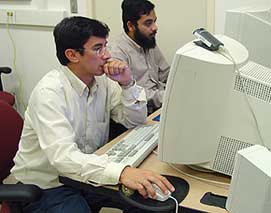 |
|||||||||
|
Education Feature Stories: Other News: |
|
Computing and Information Sciences Meet Biomedicine
The new graduate program in Biomedical and Health Informatics at the UW was established to enhance understanding of human biology, medicine and health by applying computing and information science to the expanding pool of biomedical knowledge. Biomedical informatics is at the intersection between biomedicine and information sciences. The program is a reflection of the vast amount of information available to medical investigators and practicing physicians, and the myriad ways information collection and analysis are being applied in research and patient care.
The program is housed in the Department of Medical Education and brings together faculty members from more than 20 departments in the schools and colleges of dentistry, engineering, information, medicine, nursing, pharmacy, and public health. Students in the program receive interdisciplinary training for research and teaching careers in health care information management, health-care computing, public health, and bioinformatics.
 |
By drawing from the many disciplines that are the basis of biomedicine and information science, the Biomedical and Health Informatics graduate program is designed to enhance research and patient care. One of only a few programs in the nation that offers a master's degree in the field, the UW program educates and prepares students for work in a diverse range of fields, including research, development, public health, and the health-care computing industry. A PH.D. degree program is planned to be offered in the 2002-2003 academic year. |
The core teaching and research faculty members of the graduate program have appointments (primary, joint, or adjunct) in the Division of Biomedical and Health Informatics and also in the Department of Medical Education. The division, founded by Dr. Sherrilynne Fuller, professor of medical education and director of Health Sciences Libraries, provides a venue for faculty members engaged in biomedical and health informatics to share ideas and resources for both research and training. The program’s director, Dr. Ira Kalet, is an associate professor of radiation oncology, medical physics, and medical education. Kalet is also an adjunct associate professor in the departments of Computer Science and Engineering, Bioengineering and Biological Structure.
The program’s goal, he said, is to prepare students for research, development, and teaching careers in academic biomedical and health informatics, information management in health care, the health-care computing industry, the bioinformatics industry, public health, dentistry, medicine, nursing, and pharmacy. There are only a handful of such programs nationally. The UW program anticipates taking a leadership role in biomedical and health informatics education, including the training of the next generation of informatics leaders and educators.
The program offers a master’s degree in biomedical and health informatics. A Ph.D. degree program is in the final planning stages and is expected to be offered beginning in the 2002-2003 academic year. The core curriculum for the program includes courses in biology, medicine and health; computing and information science; and biomedical and health informatics. Courses in the program are open to graduate students in other fields of study as well as undergraduates and students in medical and health professional programs. These courses cover such topics as: computing concepts and programming, biology for informaticists, bioinformatics and gene sequence analysis, informatics research and evaluation methodology, appraising and applying evidence in health care, and systematic reviews and meta-analysis of evidence.
Deputy Program Director and Curriculum Committee Chair Dr. Peter Tarczy-Hornoch, associate professor of medical education and head of the Division of Biomedical and Health Informatics, and associate professor of pediatrics, in the divisions of Neonatology and Respiratory Diseases, said the program’s research training opportunities are rich and broad. Ongoing research can be grouped into five core areas: structural informatics, clinical informatics, knowledge representation, bioinformatics, and emerging technologies. These are areas, said Tarczy-Hornoch, where there is a critical mass of investigators, funding, prior research, and mentorship available to students seeking a suitable research project to pursue in collaboration with a broader group.
|
| UW AMC Medical Center | UW School of Medicine | Harborview | UW MC | Search UW AMC | UW Home | Contact Us | ©2001-2002, University of Washington Academic Medical Center. All rights reserved. Please honor our copyrights. |
|